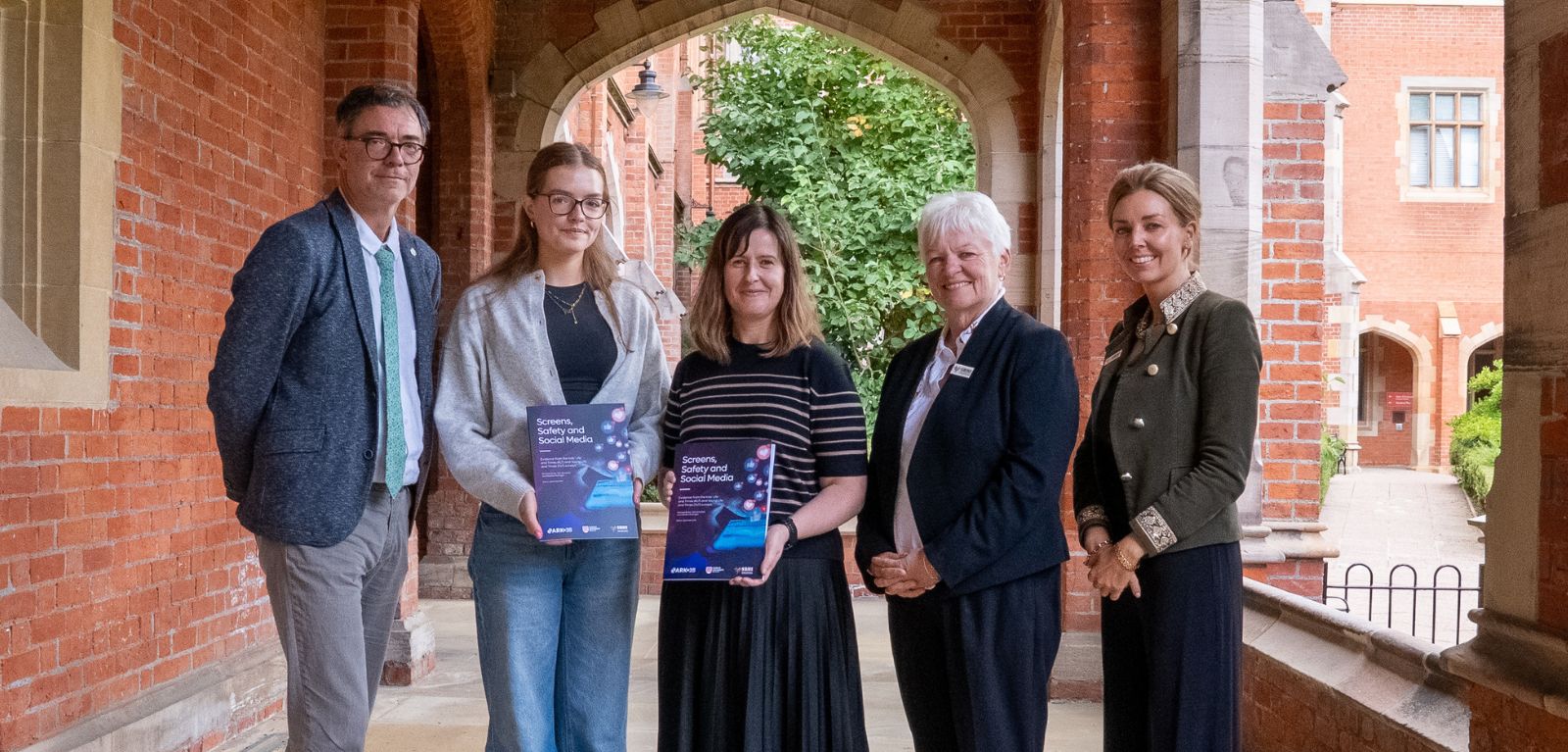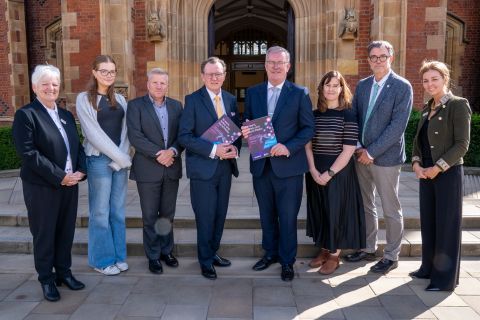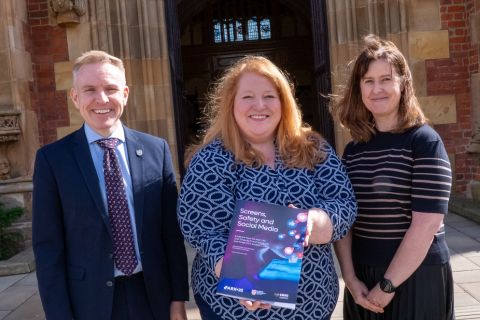Over Half of 16-Year-Olds Report Experiencing Illegal and/or Harmful Behaviours on Social Media
New research from the 2025 Northern Ireland Young Life and Times (YLT) survey reveals that over half of 16 years olds have experienced illegal and/or harmful behaviours on social media.

The most common behaviours experienced were the posting/sharing of offensive, indecent or obscene material, sharing material without consent, and online stalking, all of which were experienced by at least one in five young people who took part in the survey.
Young women were more likely to have experienced these illegal and/or harmful behaviours, as well as same-sex attracted young people, those with a disability or long-term illness, and those from lower socio-economic backgrounds.
While over one in four young people said the perpetrator was a ‘stranger’, over two-thirds identified the perpetrators as known to them offline, including friends/classmates (29%), another young person (17%), an ex-girlfriend/boyfriend (15%), a current girlfriend/boyfriend (2%), a family member (2%) or another adult (2%).
The research was led by Professor Michelle Butler, Professor Dirk Schubotz and Dr Martina McKnight from the School of Social Sciences, Education and Social Work at Queen’s, with support from the Safeguarding Board for Northern Ireland.

Professor Butler commented: “This is the first time the Young Life and Times survey has asked 16-year-olds in Northern Ireland about their experience of illegal and/or harmful behaviours on social media.
“Based on the findings, social media companies need to consider how the features of their apps may facilitate illegal and/or harmful behaviours, and we need to tackle perceptions that it is normal for people to engage in such behaviours. More research is also required to understand the relationship between these experiences and a person’s mental health and wellbeing.”
Health Minister Mike Nesbitt said: “As Minister responsible for both the Safeguarding Board for Northern Ireland and the Online Safety Strategy, I am deeply committed to ensuring that our children and young people are safe, supported and empowered in the digital world.
“The Screens, Safety and Social Media report offers a powerful insight into the lived experiences of young people online, highlighting both the opportunities and the risks they face.
“We must listen, reflect, and act. Online safety is not the responsibility of one group. It’s a shared mission. Together, we can shape a safer, kinder digital world in which every child can thrive.”
Justice Minister Naomi Long said: “This research will provide a unique perspective through the voices of young people, enabling us to build upon existing safeguards. Online service providers must ensure their reporting mechanisms are transparent, easily accessible, and taken seriously, with concerns handled promptly and sensitively. Equally important is the need to educate and empower children and young people. My Department, in collaboration with partners, continues to address the complex and cross-cutting challenges associated with online safety. However, as widely acknowledged, a criminal justice response alone is insufficient. Safeguarding children in the digital environment is a shared responsibility across all government departments.”

The report used data from the Kids’ Life and Times (KLT) and YLT surveys to explore children and young people’s use of the Internet and social media. The KLT and YLT surveys are part of a suite of three annual social attitudinal surveys undertaken by ARK, Northern Ireland’s Social Policy Hub – a joint initiative between Queen’s and Ulster University. In 2025, for the first time, the YLT survey asked about experiences of illegal and/or harmful behaviours on social media, with 2,129 young people completing the survey.
The research found that over three quarters of YLT respondents spent at least three hours on average per day on social media, whilst three in ten spent six hours or more. Females tended to spend more time on social media than their male counterparts.
The survey also found a relationship between the time respondents spent on social media each day and poorer mental health.
Professor Sir Ian Greer, President and Vice-Chancellor of Queen’s commented: “This important research highlights the crucial role Queen’s researchers play in addressing some of the most pressing issues facing society today. By giving our young people a voice to express their experiences on social media, the findings provide valuable evidence to inform policy, practice and regulation in this space to ensure their safety going forward.”
Professor Schubotz explained: “The YLT survey was established to help those working with and on behalf of young people gain better insights into young people’s lives, and to inform policy interventions and programmes for young people.
“Social media has become a significant part of how young people spend their time and how they communicate with each other. Our research shows that this comes with risks that should not be ignored. I hope the YLT survey results go a long way to encourage meaningful and respectful conversations with young people about what sensible levels of engagement with social media look like and how they can protect themselves from risks and harm.”
Bernie McNally, Independent Chair of the Safeguarding Board for Northern Ireland said: “Through this research, young people are clearly telling us about the illegal and harmful behaviours they’re experiencing on social media. At the Safeguarding Board for Northern Ireland, one of our key priorities is to ensure that children and young people’s voices shape how we respond to these challenges. While we continue to work collaboratively with a wide range of partners and take proactive steps to protect children, it’s clear that more must be done. We need stronger, enforceable regulation and online platforms must be held fully accountable for the environments they create.”
The research report is published as the UK Online Safety Act came into effect in July 2025, requiring online providers to ensure that users, particularly children and young people, are protected from accessing harmful content online.
The report’s key recommendations include:
-
More awareness raising and education in school and at home.
-
Need for more research and greater recognition of how social media experiences may affect mental health and wellbeing.
-
Better reporting mechanisms and stricter sanctions for perpetrators of illegal and/or harmful behaviours on social media.
-
Implementation, regulation, and enforcement of the United Kingdom (UK) Online Safety Act 2023.
-
Monitoring of research into adaptive artificial intelligence (AI) generated algorithms.
The report ‘Screens, Safety and Social Media’ is available here: https://www.ark.ac.uk/ARK/ylt/
Media
Media enquiries to Zara McBrearty on email: z.mcbrearty@qub.ac.uk or Mob: 07795676858